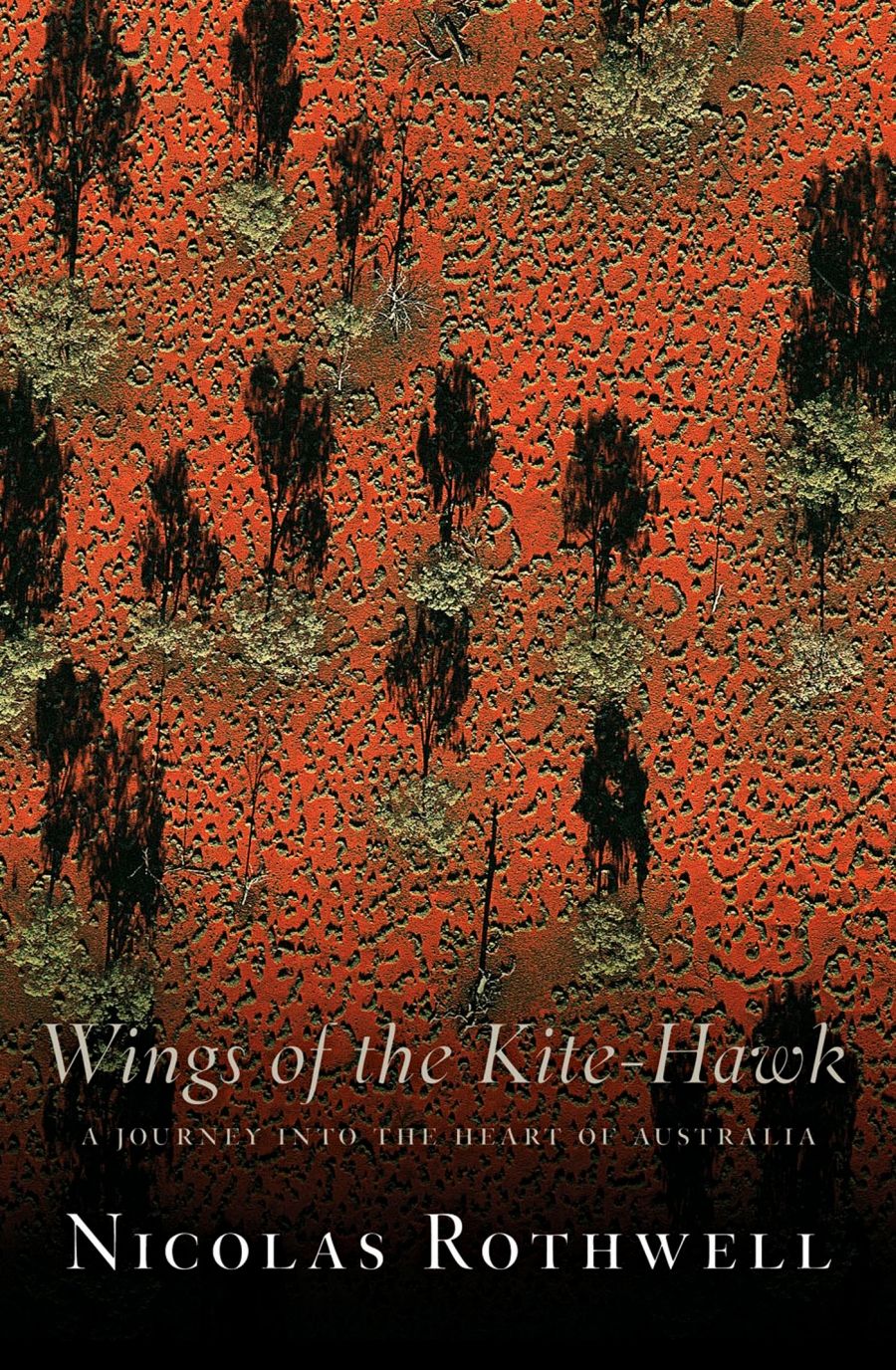
- Free Article: No
- Review Article: Yes
- Article Title: Sounding-Boards of the Heart
- Online Only: No
- Custom Highlight Text:
Most of us were taught at school to understand the difference between discovery and invention. Both words imply finding, but discovery meant finding something that already existed ‘out there’ in the concrete world; inventions were found in the imagination. Explorers discovered; scientists invented.
- Book 1 Title: Wings of the Kite-Hawk: A journey into the heart of Australia
- Book 1 Biblio: Picador, $30 pb, 327 pp
As we began to rethink the European story of discovery and colonisation, many of us began to realise that these two categories were by no means watertight. Exploration can also be an act of invention: humans are capable of imagining a world and then finding it. The Australian landscape is full of place names which suggest that the Europeans who first set foot there were looking at unfamiliar country through a prism of familiar concepts, turning it into something they could understand, relate to and even profit from. Strange and remote places were made to carry the names of minor nineteenth-century political functionaries. So far from home, it was good to be reminded of home. The place needed to be rationalised.
Of recent times, however, people have found a third understanding of what the explorers were really on about. It was neither discovery nor invention, but description. The word is used in the same sense as it is by medical researchers who don’t discover new conditions but, in the language of the trade, describe them.
We are witnessing a new and fruitful interest in the journals and letters of Australian explorers, in their arcane, mannered, bombastic, vulnerable, confused, despairing, callous and compassionate writings. The words they attached to their experiences tell us a great deal about early encounters between the Australian landscape and the European mind, and about how they altered each other. These days, we are as likely to be interested in the language explorers used as the maps they drew, in their words as much as their measurements. We are increasingly fascinated by the ones who didn’t find very much.
Nicolas Rothwell’s Wings of the Kite-Hawk is firmly in this tradition. The book retraces the steps of explorers such as Leichhardt, Sturt, and Giles, and investigates what they were able to make, simultaneously, of both themselves and their new environment. It also follows both Carl and Theodor Strehlow, father and son, whose frontier was the point at which Aboriginal and European thought met; it was a frontier created by language and image. Alighting in particular on the figures of Leichhardt, Sturt, and Giles, Rothwell is investing in that later group of nineteenth-century explorers who, to borrow a phrase from Fawlty Towers, provide psychology with enough material for an entire convention. The earlier group, which included Hume, Hovell, Oxley, and Mitchell, also had their complexities. But there is something reassuring about the fact that these men were ambitious and greedy. They were after land – useful land. Most people can relate to that.
Rothwell deals brilliantly with a more quixotic and elusive band. This group did overlap with the earlier one: Sturt and Hume travelled to the Darling together and, despite the fact that Sturt inadvertently ripped Hume’s name off the Murray, they were friends: an odd couple. Mitchell and Leichhardt, as Rothwell attests, were rivals. But Rothwell is interested in men whose mental furniture was ornate and uncomfortable. He probes their writings with gentleness and understanding:
Leichhardt regarded the landscape as a sounding-board of his heart … Sturt was not much troubled by the psychological condition of his men – he had his hands full in his own universe … [Giles] was a creature free from sentiment, a solitary, self-dependent man … He was the freest, the most literal, the most disturbing of all the explorers ... His being comes through sharply in his words. He lives, he breathes, he seems to stand close by his reader, speaking, whispering, leading forever on …
Rothwell is not the first to have mined the writings of these and other explorers. Patrick White’s Voss, inspired by the journals of Edward Eyre and based on an image of Leichhardt, comes to mind. But few have listened to these strange men as intently as Rothwell. For all his admirable qualities, White was never a listener. Rothwell has an open ear. This is a considerable asset for a writer engaged in a project of this sort.
Wings of the Kite-Hawk also covers more recent exploration. It tells of Cecil Madigan, for example, the last of the Australian explorers in the traditional sense of the word. In 1939 he crossed the Simpson Desert, an expanse that now bears the name of Madigan’s mate but that does not have so much as a dune named after Madigan himself. Others include Sam Hazlett, who began his long camel treks in 1904, and a north Queensland pioneer, Frank Henry Hann. Rothwell describes these men as belonging to a ‘near-secret tradition’. They left few records. ‘This obscurity is far from accidental, for, in its last phases, exploration, like life, becomes a retreat, a silence, a turning in.’
Rothwell’s own travels criss-cross those of his precursors. They include some wonderful set pieces, such as a surreal encounter with Pauline Hanson in the streets of Broken Hill. Rothwell and his companion, Johnson, enter into lengthy negotiations with Hanson to take her photograph. It says something, however, that Hanson is by no means the most bizarre character to crop up in these pages. The outback yields a rich harvest of human oddity. Of Rothwell himself, we catch only glimpses. In some ways, he seems to hover above the world he is describing, keeping all of it in view.


Comments powered by CComment